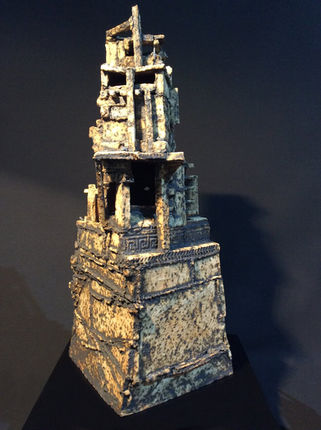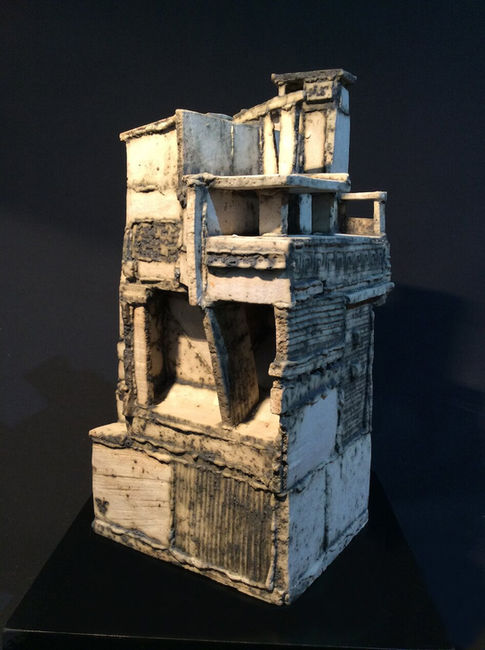Mehmet Fatih Karagul
Mehmet Fatih KARAGÜL 1971 Nişantaşı, İstanbul.
In 1994, he completed his undergraduate education at Mimar Sinan University, Faculty of Fine Arts, Department of Ceramics. He completed his Master's Degree in 1997 and Proficiency in Art in 2002 at the Institute of Social Sciences of the same university. He realized national and international projects, participated in exhibitions, biennials, congresses, symposiums and workshops. He opened 5 personal exhibitions. As the founder of Hür Enterprise Art Group, he participated in 5 group exhibitions. There are 5 art awards in its field. Between 1992-1997, he worked as a volunteer restorer in Çanakkale Assos archaeological excavation for 6 terms. He has been working at Çanakkale Onsekiz Mart University, Faculty of Fine Arts since 1999. Space, contrast, space, light and texture are the basis for shaping the works. In his sculptures, collages and assemblies, he uses solidified tiles, porcelain, paper-reinforced ceramics, metal, and paper and waste materials as auxiliary materials. He uses bronze in his recent works.
Selected Events
-2020 Turkey-Korea Invitational Ceramic Exhibition, G.Kora Embassy
-2019 "International 23 th Panlesvian Ceramic Exhibition", Lesbos Island, Greece
-2019 "The 10th Gyeonggi International Ceramic Biennale" S. Korea
-2018 "The 7.th International Changchun Ceramics Symposium" China
-2018 "TROIA" Personal Sculpture Exhibition, D1art Art Gallery, Galata Istanbul
-2018 World Art Day "Akademix II" UPSD Gallery, Maçka Democracy Park, Istanbul
-2016 "International Ceramic Biennial" Latvia
-2015 “16. International Ex-Tempore Piran ”Ceramic Exhibition, Slovenia
-2015 “9. International Ceramic Congress Exhibition ”Afyon Kocatepe University
Awards
-2020 "Honorable Mention", International Korean Ceramic Biennial
-1996 "Special Award, İzmir Rotary Club
-1994 "Symbol Competition Special Award, Turkish Ceramics Association
-1994 "Achievement Award, Sinter Seramik
-1993 "Tile Design Honorable Mention, Ege Ferro
"TROAS TRIALS"
During the online exhibition, art lovers can safely visit the exhibition at the address below. Don't forget to make an appointment!
Address:
Fevzipaşa District, Medrese Street, No: 1 / B
Center / Canakkale
Time: 13: 00-18: 00
On Mondays and Fridays
"The rights to copy, reproduce, distribute or use the related content of the related art work and the related content of the artwork belong to the artist. It is published in Fovart with the permission of the artist. Written permission from the artist is required to perform the above-mentioned acts."
"The rights to copy, reproduce, distribute or use the related content of the related art work and the related content of the artwork belong to the artist. It is published in Fovart with the permission of the artist. Written permission from the artist is required to perform the above-mentioned acts."
"Any nation in the world that wants to be civilized, advanced and mature,
sooner or later he will train sculptors to make sculptures
Veteran Mustafa Kemal Ataturk "
Speeches and Statements on 22 January 1923
Pandemic, which has caused tangible changes in our social life since March 2020, has brought us against obstacles in reaching the masses of artistic actions and thoughts. From the sacred areas of Göbekli Tepe to our time, the existence of concrete and abstract phenomena that nature and man have contributed to and produced in our daily life cannot be denied for centuries. In this context, it is the artists who emerge from the essence and traditions of societies that make us think culturally, artistically and intellectually. Culture reveals the existence of art and artist as a result of the intellectual satisfaction of the process that begins with the birth of human beings. Artists want to tell us the visual richness offered by nature and human intelligence in an intellectual way in their works. Ceramic Artist Dr. Fatih Karagül's desire to tell a historical process with terracotta-porcelain, influenced by the geography he lived in, was born from this humanist approach. Since the pre-Neolithic Age, the Anatolian lands owes the cultural evolution it has undergone, its departure to space and its inevitable rise in informatics, which today's continental Europe has achieved, to Ionian Philosophy schools. Artists have prepared opportunities to think and educate us with their concrete intellectual works that they put forward in the reaching of civilization between continents. Ceramic Artist and academician Dr. Fatih Karagül also succeeded in presenting the Troian civilization and the first total war that it was exposed to, with his symbolic works by being influenced by the Iliad epic of the great poet Homer from Izmir, and the mythological narratives of a war that lasted for 10 years, successfully with terracotta.
The Trojan war is a result of the expansionist-greedy attitude of the West towards the Aegean and Anatolian lands 3000 years ago. We learn about this expansion through the narratives of Abdal Homeros from Izmir. Fatih Karagül starts his exhibition with the citizens of Perkote who came to help the people of Troia, the Yüksek Hisarlı-castles. It continues with the altar. Altar and sacrifice are very important in Troia life. They sacrifice the bull. There are many altars in Troy, but the altar told by Homer is depicted visually in the relief drums (Ayvacık_Gülpınar village) uncovered in the Apollon Smintheus temple excavations I have conducted since 1980. Agamemnon kidnaps Chryses's daughter Chryseis, the priest of Apollo Smintheus temple, on his way to Troy. Father Chryses begs Apollo to return his daughter. Agamemnon doesn't want to give the girl back. Apollo sends the plague epidemic to the Akha army with his arrows. Finally, the knowing-oracle Kalhas says give the girl back, Apollo lift the plague. This is how the artist wants to tell us the interpretation of this scene with a grotesque-symbolic description. There is music in every period in the province of Troia. While he was singing the epic of Homer, he probably made him listen to it with an instrument like our abdals. Later, the lovers spoke his words in the odeon. We briefly explained some examples from the works of the artist with his fictions. Artists always want to tell us a message, a past and lessons to be learned from life in their works. Artist academic Dr. In his works, Fatih Karagül successfully tells us the experiences of Troy, the city of Troas, the region where he lived, in his unique language, with the cultural gains he has accumulated from Homer.
1 December 2020 Babakale
Prof. dr. A. Coşkun Özgünel
Gülpınar, Apollon Smintheus Excavations
Honorary President
Ankara university



















